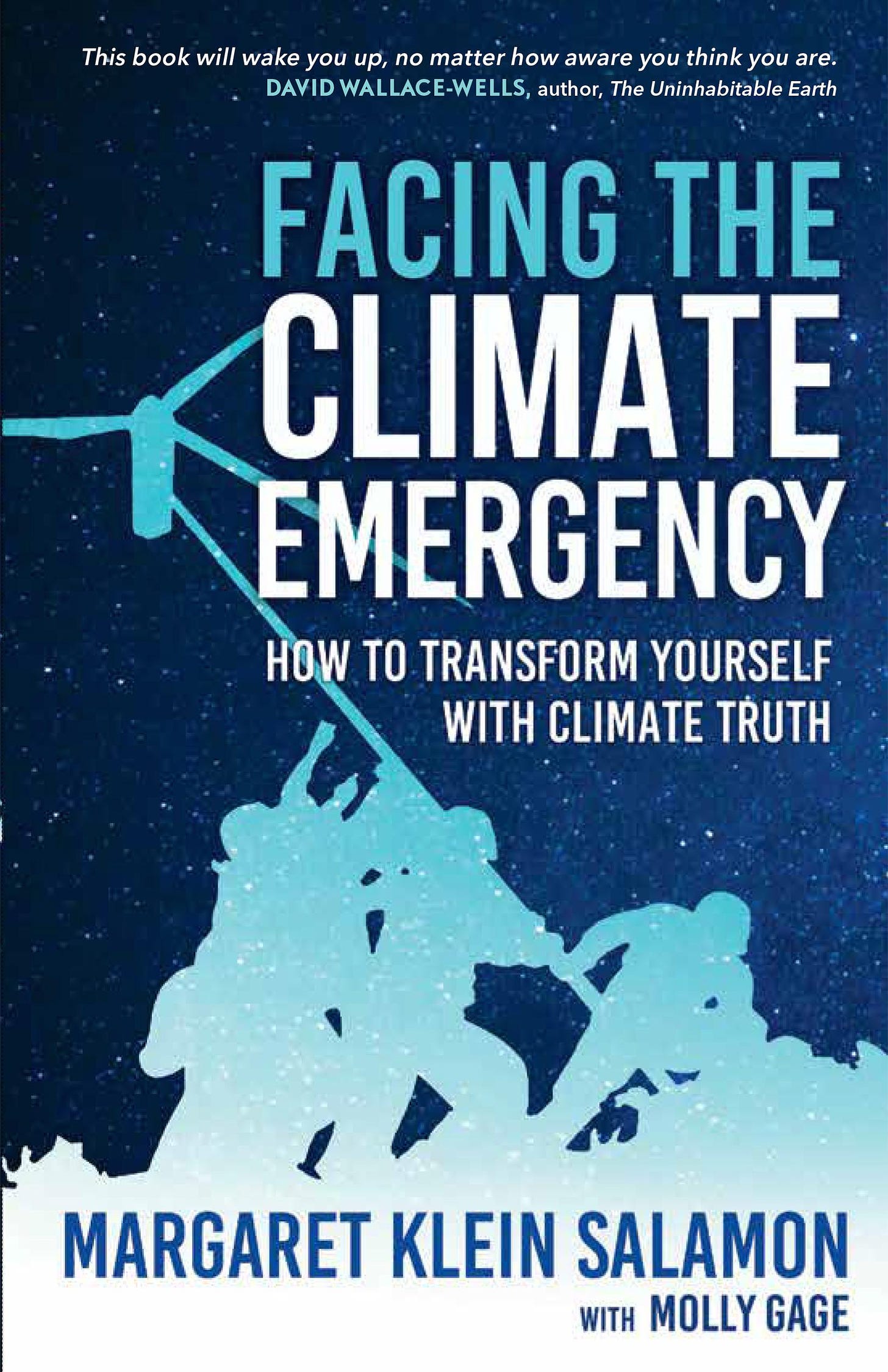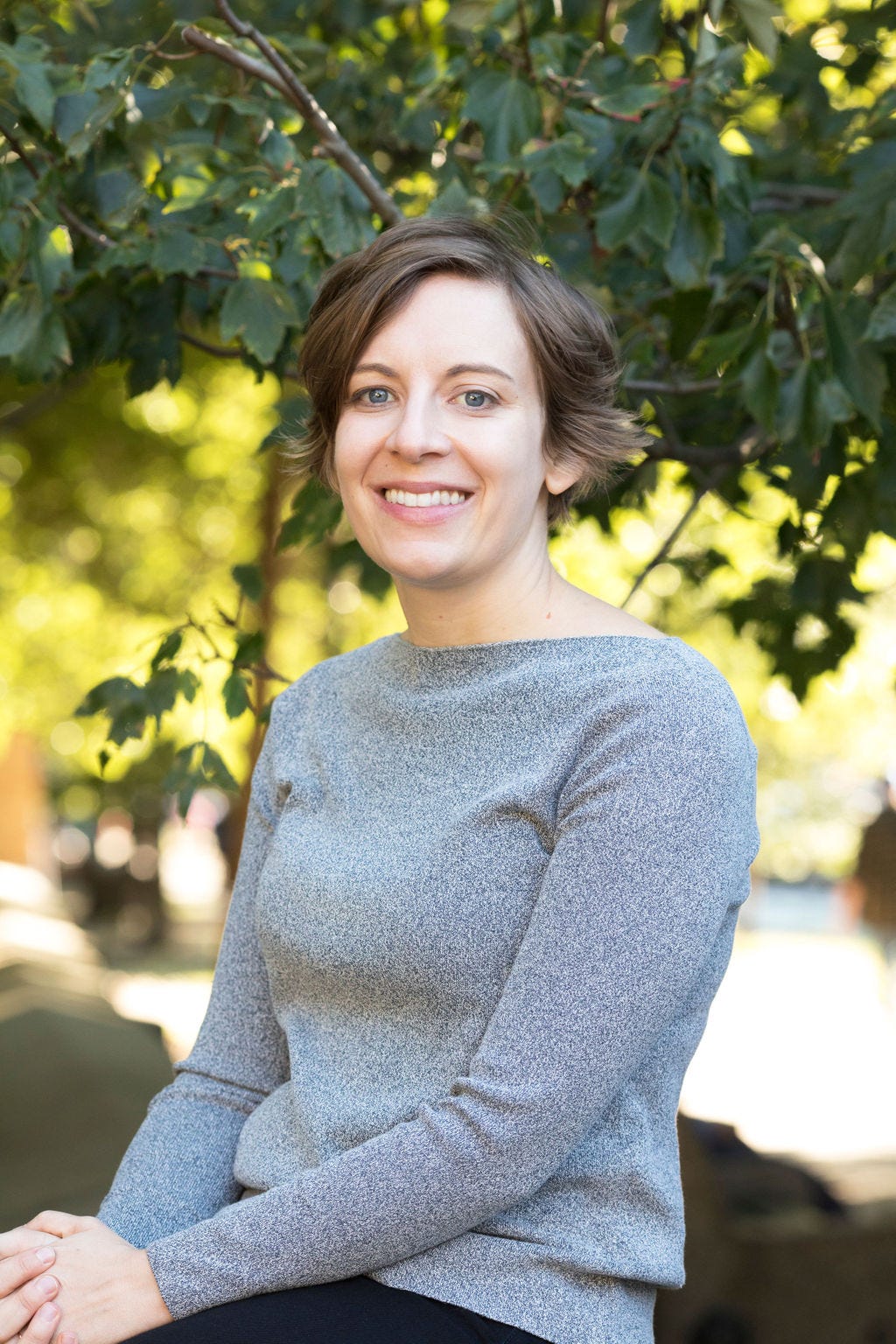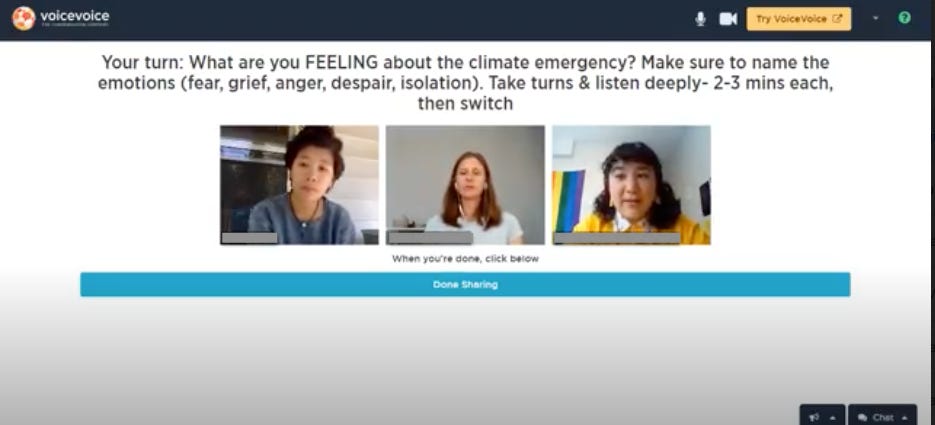Using grief, rage and dread to collectively wake up from the trance of denial
A conversation with activist, psychologist and author Margaret Klein Salamon
Hi Gen Dread head!
This week I’m in conversation with Margaret Klein Salamon, Founder of The Climate Mobilization and author of Facing the Climate Emergency: How to Transform Yourself with Climate Truth. Margaret has a PhD in clinical psychology and the heart of a warrior. Her book, which came out in the early days of the pandemic, focuses on the merits of climate grief for changing the world. It calls on readers to awaken the most existential parts of themselves —to process the pain that dwells there—and use it to find their calling at this historic time. She is remarkably adept at straddling the worlds of activism and psychotherapeutic knowledge. I’m hope you enjoy our back and forth and that her words will move the parts of you that want to (and perhaps already do) take bold climate action.
(Oh, and for free weekly digests in your inbox about staying sane in the climate crisis, just hit the subscribe button!)
BW: In your book, you focus on full-scale political mobilization as the end point of where a person can and should meaningfully arrive after they’ve grieved the loss of the future they thought would come — a future of ecological stability —and now realize that it won’t. You write about how a person can start their own activist movement like you did, and encourage people to join local chapters of already existing groups, such as Extinction Rebellion. Mobilization, in this way, becomes a coping tool.
How do you feel about the choices and strategies of people who don’t reinvest the energy they’ve lost from their “climate grieving” into political mobilization, and instead put it into other not-so-explicitly political work? I’m thinking art, teaching, storytelling, parenting, other kinds of community care… It’s clear that we need massive political, social and economic change to save as much of life as we can and protect the most vulnerable. So are you in any way against or uncomfortable with coping mechanisms for eco-anxiety and climate grief that don’t include this kind of explicit activist work?
MKS: We are perilously close to the collapse of civilization, we are all in danger, and only a mobilization of our entire economy and society, on the scale of WWII, can protect us. How do we initiate the political outcome that could save as much life, as much stability, as possible? We need to enter “emergency mode” and build the largest, most powerful social movement the world has ever seen.
That is my understanding of the situation. Full-scale mobilization or collapse.
This movement will “win” when the local, state, and national governments, start treating the climate and ecological emergencies as actual dire emergencies, and transforming their legislation, resource allocation, and communications in response. The federal government is critical, as it is the only body that has the power to ban destructive practices such as factory farms, and spend without limit in order to massively expand renewable energy, build a smart grid, massively expand public transit, and transition our agriculture to regenerative. Other institutions like universities, labor unions, and media, will also enter emergency mode, and join the mobilization.
So yes, I encourage everyone to be a part of that Climate Emergency/Climate Mobilization movement. But it still doesn’t answer the question for individuals “What should I do?” Social movements are incredibly complex ecosystems, with a wide variety of institutions and people that hold them up, including active supporters, passive supporters. Organizations like XR, Sunrise, The Climate Mobilization, and school strikes are all part of this social movement. But so are educators who teach their students the truth about the climate emergency, journalists who report on the climate emergency and encourage it to be given proper attention and coverage, religious people who urge their congregations to reckon with the climate emergency, and more.
People need to figure out where they fit in. “What can I do?” is as personal and complicated a question as “What career should I pursue?” Step 5 of my book is about this — helping readers think through where their skills, passions, risk tolerance, time commitment, and resources can support the movement.
The one thing I recommend to everyone is to talk about the climate emergency, as much as possible, and emotionally.
No need to give a powerpoint about CO2 levels. Talk about how it feels to be living at this time. Talk about what you think the future holds. Talk about your fear, dread, rage, grief and everything else. This contributes to transformative change; it helps us collectively wake up from the trance of denial.
On that note, Breaking the Silence: Let’s Talk about Climate Emergency Feelings is a program I have developed to help people do just that. It’s a small group sharing and listening session, guided by videos and conversation prompts from me. It’s a space for the climate aware to connect with others who are going through the same things they are. Unlike intellectually (or action) focused climate conversations, BTS is a chance to look inward, and connect with others about the human experience of living in this age of crises. You can register for an upcoming conversation here.
Below: a screenshot from one of the BTS conversations (with permission to share).
BW: In my own forthcoming book, I write about you as being an example of a “prospective survivor” as Robert Jay Lifton articulated the concept. While a survivor is someone who has touched death but made it out alive, a prospective survivor is someone who vividly imagines how they might encounter their own end. In his book The Climate Swerve Lifton writes, “As prospective survivors we can find meaning in our actions to combat climate change. We can take on a survivor mission of preserving our habitat and embracing genuine forms of adaptation for our species. In doing so we reassert our larger human connectedness, our bond with our species.”
Now I’ve interviewed you before and you once told me how your grandmother survived the Holocaust and how that created an awareness in your bones that truly unthinkably awful things can and do happen to people. You also experienced Hurricane Sandy in 2012 and that ordeal shook you deeply and led you to reorient your life towards working on The Climate Mobilization. Both seem to me to have given you a “prospective survivor’s” vivid understanding and imagination of what terror can befall us - and is already happening to us - in the climate crisis. This sensibility seems to have deeply informed your life’s work and mission. Do you think of yourself as a “prospective survivor” in this way? If no, why not? And if yes, what can you tell the rest of us about what it is like to live as a “prospective survivor”? What power might this identity hold for us in this crisis? How might we harness it?
MKS: This is a fascinating concept. I do resonate with being a “prospective survivor” (tho it's a bit of a clunky term.) I think I have truly emotionally faced the horrors of what the future holds on our current trajectory. I have felt so much pain about the crisis, and let it motivate me to action-- undertaking the mission of protecting humanity and life, as Lifton describes. I think my ability to do that is significantly based on the fact that I have had traumatic life experiences-- both the secondary trauma of the Holocaust, and the trauma of witnessing my boyfriend’s psychotic break. This was a first hand experience of sudden, catastrophic collapse. I was deeply impacted, traumatized, by this experience, and I made the experience of women who survive their partners’ psychotic episodes the topic of my dissertation. The theme that kept coming up in my interviews was “no one understands.” Friends, family, and colleagues wanted to be optimistic about the situation, and ended up underplaying its severity.
So I was particularly well prepared to digest the emotional side of the climate emergency, having studied and emotionally processed the experience of living through catastrophe collapse, combined with the immense pressure from all around to put on a happy face, make the situation OK, use euphemisms, and keep it optimistic.
One concept I would add is the idea of “grieving the future you thought you had.” Grieving for the future, including your future, opens up the space for a new identity and trajectory to emerge, one that is on a “survival mission” for all humanity.
As I began to face climate truth in the last ten years, I realized that the lovely life I had planned on-- being a clinical psychologist, writing books, having a family, was based on a false sense of stability. The world would be collapsing while I pursued my career and family life. Ultimately, I had to acknowledge that the future I had planned on was ruined.
I was never going to be able to lead a happy and satisfying life while watching the world burn.
I had to say goodbye to the future I had planned for myself. Leaving those plans behind created the space for something new, a new view of myself and my mission.
BW: Your book is very action and outcomes oriented, in the way it is written. The chapters guide the reader to change their identity and change their life. Are there any stories you can share with us of what readers have perhaps shared with you about how the book has affected them in these ways? Any anecdotes about drastic life changes or career shifts or personal awakenings?
MKS: When I was growing the Climate Mobilization for the past 6 years, we saw so many people taking heroic personal action. People leaving their jobs to work full time as volunteers for the movement. Or shifting to part time. Leaving law school. Moving in with parents. All to create the conditions where they can dedicate themselves more and more, to the movement.
With the book — yes, I have gotten some great feedback from readers that it inspired them to devote more of themselves, significantly more time and money, to the movement; overcome anxiety in order to talk about the climate emergency with others; and reconsider their careers. The biggest thing people tell me is that the book made them feel less alone, more clear in their priorities, and more emotionally resilient in the face of this crisis.
BW: I very much hear that. I felt similarly reading it.
How are you feeling right now?
Riled up? Resolved? Something else? Let me know in the comments below.
If you haven’t yet read Margaret’s book and are interested in the climate and wider eco-crisis as well as existential resilience, grief, courage, coping and action, do yourself a favour and check it out here.
The more we talk about these feelings, the more we normalize them. The more we normalize them, the more we allow others to talk about them too. The more that others talk about them, the more powerful this movement becomes. Our future relies on our feelings.
Get in touch
As always, you can reach me - and each other - by commenting on this article. You can also hit reply to this email or follow me on Twitter and Instagram.
Take good care and see you next week!








Thank you for another insightful and depression busting read.
I have a bit of unease about the US centered nature of the tips above. I do get it: you are in the US, that is a big country, and a lot is happening there. So attention is perfectly warranted. But the world is larger than the US, and Climate Change blatantly disregards borders, so cooperation is something that will be needed. US persons to have an interest in other parts of the world would be appreciated (EU, China come to my mind as big and active power blocks, but I mean all 170 countries). Attention to working internationally, and what psychological surprises that holds for us activists, would be an interesting topic to see in a next time.
Loved this issue, in particular the mention of a lover witnessing their significant others' psychotic break. I'm grateful to the courageous people who participated in the conversation. As someone who experienced a psychotic break in a third world country and someone that studied global health and sustainability, I think in order for us to activate this WWII-style worldwide call to action we're going to have to see something deeply inspiring: spirit-led, perhaps, as movements often are, and at the intersection of all of the movements that exist already. I personally see something very artistic in nature sprouting, trauma-informed, and truly sensitive in the ways that we heal one another in our simple humanities. How it'll happen structurally I'm not sure, maybe this is currently being explored in the U.S.